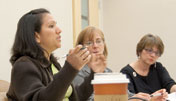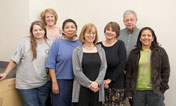Assessing the Health Care Needs of Lansing Area Latinos
- Linda M. Hunt
- Professor
- Department of Anthropology
- College of Social Science

The researchers interviewed Lansing area Latinos about their health care resources and problems.
Latinos are the most likely of all groups in the U.S. to lack health care coverage, with an estimated 32% uninsured as of 2007. "Most Latinos are employed, but they are overrepresented in low-wage and informal employment," said Dr. Linda Hunt, who describes herself as a medical anthropologist. "Limited English proficiency and questions of legal documentation may further complicate their health care issues."

Monica Kwasnik, Linda Hunt, and Olga Hernández-Patino discuss issues at an LLHA board meeting.
In the spring of 2008, Hunt and graduate students taking an anthropology research methods class undertook a small exploratory study of health needs and care-seeking strategies of Latino families in Lansing. They teamed up with Lansing Latino Health Alliance (LLHA), a coalition established in 2003 with funding from Ingham County Health Department. "For LLHA," said Hunt, "the study was an innovative step forward in their effort to assess the health needs of area Latinos and identify gaps in service."
With LLHA's assistance in recruiting participants, the researchers conducted in-depth interviews (in English or Spanish) with a cross-section of Latinos living in the Greater Lansing area. The interviews focused on what they saw as their most important health problems, how they dealt with those problems, and what health care resources they used.
"We heard some amazing stories," said Hunt. "One man had an emergency appendectomy that he thought would be covered by his insurer, and he only found out afterward that it wasn't. Another person required eye surgery that was not covered by his health
insurance. He found that it was cheaper to fly home to Costa Rica for the care. His total cost—including air fare, hotel, medical charges, and aftercare—was less than what the surgery alone would have cost in Michigan."
"Most Latinos are employed, but they are overrepresented in low-wage and informal employment."
Linda Hunt
Hunt also noted that "many of our participants were confused about what services and medications were covered and which doctors' offices were willing to accept their plan. In some families every single person was covered under a different plan. Add this to the evershrinking extent of coverage and family members moving in and out of jobs...It's an extremely complicated moving target."
"This collaboration has promoted future partnerships and new grant opportunities to increase the collection of local data and the exploration of possible community-led solutions."
Olga Hernández-Patino
Her recommendations for LLHA included developing collaborative relationships with other advocacy groups; taking a closer look at access to specialists and dental and eye care; advocating for bilingual clinical services and patient information packets; and developing lectures or workshops for patients.

From left: LCC staff member Deidre Denton with LLHA Board Members Connie Currier, Linda Delgado Kipp, Linda Hunt, Olga Hernández-Patino, George Mansour, and Monica Kwasnik.
The best part of the project, said Hunt, was that "we found out a lot on a small budget. Students in my graduate methods class helped design and conduct the study. They did the interviews, processed the data, and helped with the analysis— it was a great exercise for them—and LLHA got some research questions answered for the cost of some tape recorders and food for the focus groups. It was a win-win situation."
Dr. Olga Hernández-Patino, chair of LLHA and also chair of Lansing Community College's Allied Health and Human Services Department, agrees that the collaboration has been a valuable one for the Alliance. "Each partner brought great insight as to the current health concerns and challenges facing the diverse Latino population of Lansing," she said. "The individual interviews and focus groups provided an essential starting point for understanding the myriad of health experiences this growing population confronts. This collaboration has promoted future partnerships and new grant opportunities to increase the collection of local data and the exploration of possible community-led solutions. LLHA has since partnered with the Ingham Health Department to provide H1N1 clinics and with the Michigan Department of Community Health to provide educational events that promote awareness and prevention of top health concerns for Latinos, among other special projects aligned with our mission."
- Written by Linda Chapel Jackson, University Outreach and Engagement